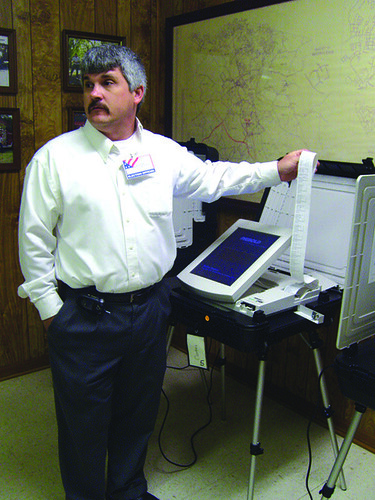
Will probably continue to look like this.
Continuing with the news I have neglected to link to in this interim period, I want to draw attention to the Elections Advisory Council convened by Secretary of State Brian Kemp.
Baldwin County is lucky to have two representatives, state Representative Rusty Kidd (I-Milledgeville) and Baldwin County Probate Court Judge Todd Blackwell, on this council that is charged with creating cost efficiencies in the state's elections system and improving the system overall.
Georgia's elections system is a mixed bag of efforts to open the ballot box to as many people as possible and throwbacks to the partisan warfare of Georgia's one-party past and present. The Athens Banner Herald editorial board has this to say about some of the opportunities for improvement that they hope the council will consider.
In terms of guaranteeing ballot access, Georgians should watch how much time and effort Kemp and the panel spend in considering current state law for third-party candidates to get on the ballot.I'm sure Rep. Kidd, who has used that ballot petition in the last two years to send a message to opponents about the number of voters who will be showing up to support him, will have plenty of ideas to share about how we can open the statehouse to Georgians who don't necessarily fit the Republican/Democratic dynamic.
Georgia is widely acknowledged to have one of the most strict ballot access laws in the country. Independent candidates - that is, candidates not running under a major party banner - must obtain the signatures of 5 percent of registered voters in their respective electoral district to get on the ballot when running for local offices, including seats in the state legislature and Congress. Independent candidates seeking statewide offices must obtain the signatures of 1 percent of the state's registered voters.
In some of the state's metropolitan areas, and, obviously, in any statewide race, the signature requirements mean that prospective independent candidates must get thousands of people to sign their petitions to seek office. In those cases, it's fair to see the ballot access laws as a de facto means of keeping third-party candidates off of ballots.
Judge Blackwell's inclusion is a welcome surprise as I've spent much time in his office talking about the ins and outs of election law. He is a great logical thinker, who can objectively explore the many facets of an issue. And most importantly, he knows what he doesn't know and retains the curiosity to explore it.
The image above comes from a photo story I submitted after shadowing Blackwell on Election Day 2008.
To put myself out on a limb, I'd recommend that the council look into the amount of time allocated to early voting. The 45 days of early voting put a significant cost on county governments to employ poll workers for dubious results in bringing people to the polls. I'm not saying that the state should walk away from early voting altogether, but I doubt that the overall turnout numbers would be affected much if early voting was confined to the two weeks before the election.
Despite the obvious opportunities for fraud in the absentee ballot system, it remains as a release valve for engaged voters to cast their ballot despite their scheduling conflicts.
So I look forward to reading the findings of this group and, as others before me, commend Secretary of State Kemp for convening an inclusive commission to consider the future of Democracy's most solemn responsibilities.

No comments:
Post a Comment